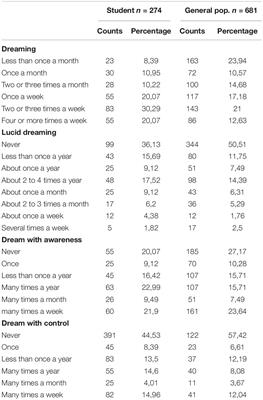Is there a link between Frequency of dreams, lucid dreams, and subjective sleep quality?
A lucid dream is a dream in which one is conscious of dreaming and can possibly control the dream or passively observe its unfolding.

Frequencies of lucid dreaming, dream with awareness and dream with actual control, were previously investigated in a French student population.As a student population usually differ on oneiric and sleep characteristics (such as sleep quality) to the general population, more investigations were needed. Additionally, it is yet unresolved if lucid dreaming is related to one’s overall sleep quality. This study aims at describing and comparing dream experience frequencies (dream, lucid dreams, awareness, and control) and sleep quality assessed with the Pittsburgh Sleep Quality Index (PSQI) among students (n = 274) and in a general population sample (n = 681). It also aims at evaluating if dream experience frequencies can predict sleep quality across these two samples.Predictive models of PSQI score controlling for age and gender were not significant in the student group while they were all marginally predictive for the general population. However, none of these models showed that the frequency of dreams experiences could actually help predict the quality of sleep as the significance of the model was carried over only by the gender variable.These results are discussed in line with previous studies on lucid dreaming frequencies. Several methodological adjustments for future study are proposed. .
Read the full article at the original website
References:
